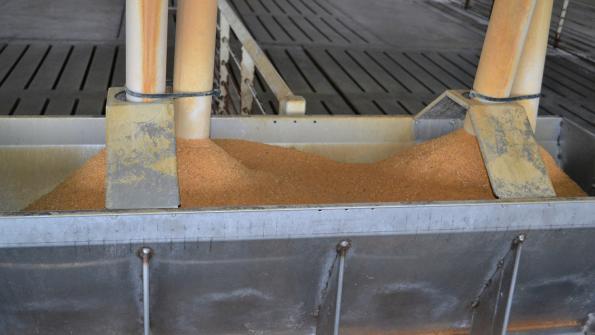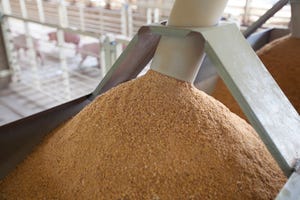Researchers set out to determine the effect of the relative concentrations of saturated, monounsaturated and polyunsaturated fatty acids on the apparent total tract digestibility of minerals in diets fed to pigs.
November 30, 2016

Added fat increases the energy content of swine diets, but it may also affect the digestibility of nutrients. Hans H. Stein, professor of animal sciences at the University of Illinois, and a team of researchers have studied the effects of fat sources with different concentrations of saturated and unsaturated fatty acids on mineral digestibility.
“In pigs, addition of soybean oil to the diets has been shown not to reduce calcium digestibility. However, some studies in pigs and humans have observed the formation of indigestible calcium-fat complexes,” says Stein. “These studies used fats that were more saturated than soybean oil.”
Therefore, Stein and his team set out to determine the effect of the relative concentrations of saturated, monounsaturated and polyunsaturated fatty acids on the apparent total tract digestibility of minerals in diets fed to pigs.
Research findings • Supplementing pig diets with either saturated or unsaturated fat increases the digestibility of calcium, phosphorus, and sulfur in the diets. • Adding supplemental fat does not decrease the digestibility of any minerals. • Fat quality may affect the digestibility of minerals. |
Five sources of supplemental fat were tested. Soybean oil and corn oil contained about 15% SFA, 26% MUFA and 57% PUFA. Palm oil and beef tallow contained about 46% SFA, 42% MUFA and 6% PUFA. The final fat source, choice white grease, contained 39% SFA, 43% MUFA and 13% PUFA.
The apparent total tract digestibility of calcium, phosphorus and sulfur was increased in pigs fed diets containing soybean oil, corn oil, palm oil or tallow compared with pigs fed diets containing no added fat or choice white grease. Added fat did not affect the ATTD of potassium, manganese, sodium or zinc, although there was a tendency for magnesium digestibility to be greater in pigs fed diets containing soybean oil or corn oil, compared with pigs fed diets containing tallow or choice white grease.
“The implication of this experiment is that producers can include added fat, whether saturated or unsaturated, in diets for pigs without creating a reduction in digestibility of calcium or other minerals,” says Stein. “However, in the case of choice white grease, there was some indication that it had been oxidized, and oxidation may reduce mineral digestibility.”
Stein says this observation warrants further investigation.
Funding for this research was provided by AB Vista Feed Ingredients of Marlborough, UK.
The paper, “Effects of tallow, choice white grease, palm oil, corn oil, or soybean oil on apparent total tract digestibility of minerals in diets fed to growing pigs,” was published in a recent issue of the Journal of Animal Science. It was co-authored by Laura Merriman and Carl Parsons of the University of Illinois, and Carrie Walk of AB Vista. The full text can be found online.
You May Also Like



